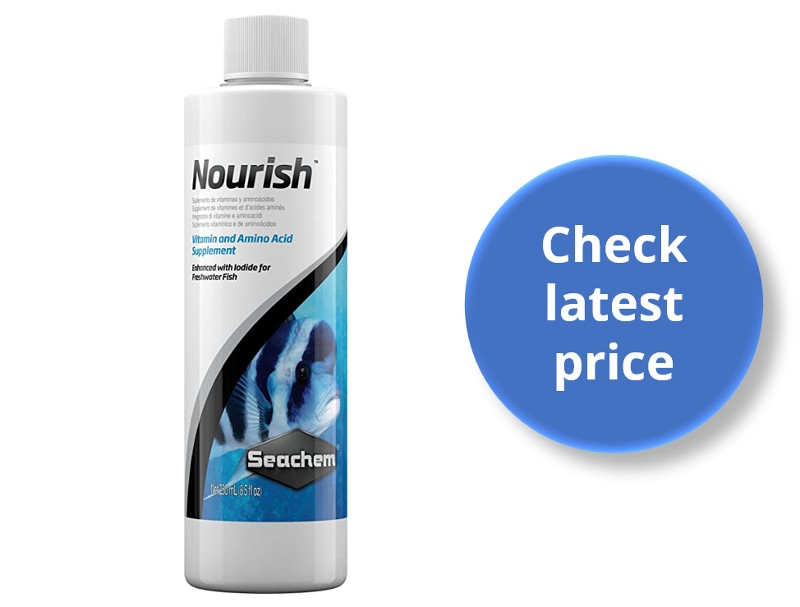Bloodworms are a tasty treat that almost every Betta fish loves, but they aren’t the healthiest option. They’re worth including in a Betta’s diet but not as the main food.
Which begs the question, how many bloodworms to feed a Betta per day, or should it even be less frequent than that? And what type of bloodworms should you be buying for your Betta?
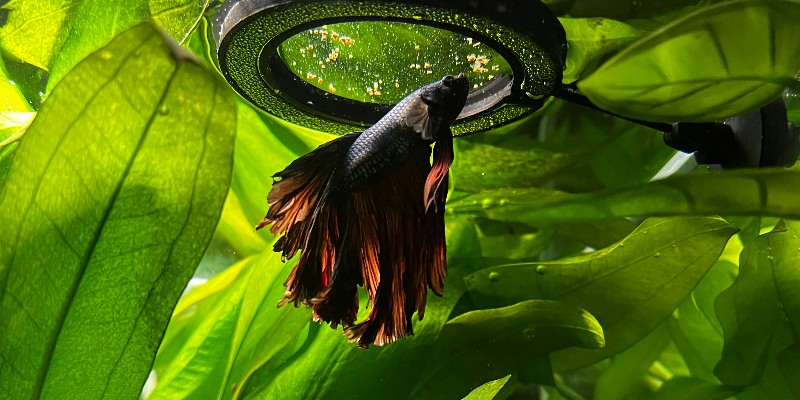
Let’s take a look at this guide which explains the nutritional value of bloodworms, the potential risks they carry, and the pros and cons of each type of bloodworm you can buy.
How many freeze-dried Bloodworms to feed to your Betta
You should only feed Bettas bloodworms once or twice a week, no matter whether they are freeze-dried, frozen, or live. And when you do feed them to your Betta, start with 1-2 at first, although you can increase this to three over time if your Betta is eating them.
Bloodworms are essentially a treat food and are high in fat, so will cause your Betta health problems if you rely on them too much in your fish’s diet.
You can’t use them as a regular meal, because they also don’t contain all the nutrients that your Betta fish needs.
Freeze-dried bloodworms in particular are the worst kind of bloodworm for nutrition, although they have other benefits such as longevity, which means storing them is easier.
But in terms of volume, there’s no difference when it comes to how many frozen bloodworms to feed your Betta either. No more than 3 at a time, and only once or twice a week.
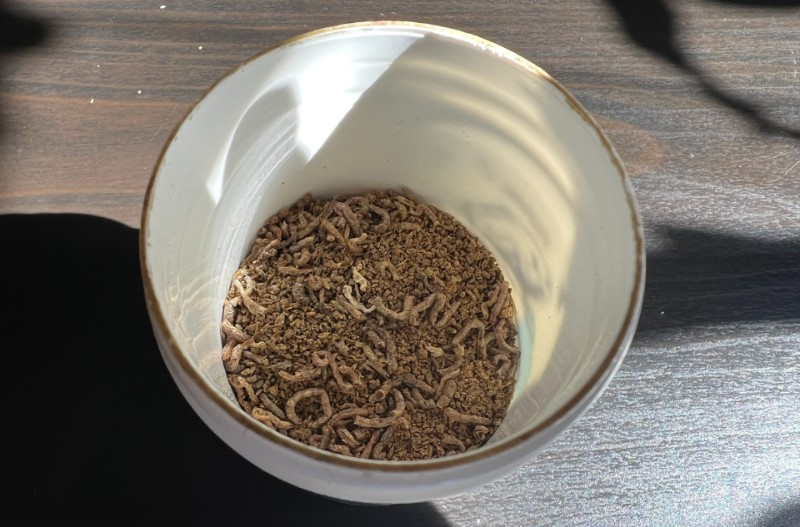
Can I feed my Betta only Bloodworms?
You can’t feed your Betta only bloodworms. They aren’t nutritious enough, and your Betta will become unhealthy and ultimately unwell if you try to. Bloodworms are fine as part of a balanced diet, but your main Betta food should be a mix of flakes and pellets that are high in protein.
Note that regular tropical flakes shouldn’t be used as Betta food. Always find a specialist Betta flake food and mix with floating Betta pellets as your Betta’s base diet.
Bloodworms do contain protein, but they’re also high in fats. So think of bloodworms as being like cheese. You wouldn’t make cheese the only thing you ate, and for the same reason, you wouldn’t just feed your Betta fish exclusively on bloodworms.
I’ve written a guide to the best food for your Betta which discusses all the nutritional needs of your Betta fish. But a couple of bloodworms, a couple of times a week? That’s a good way to treat your Betta with something they’ll enjoy.
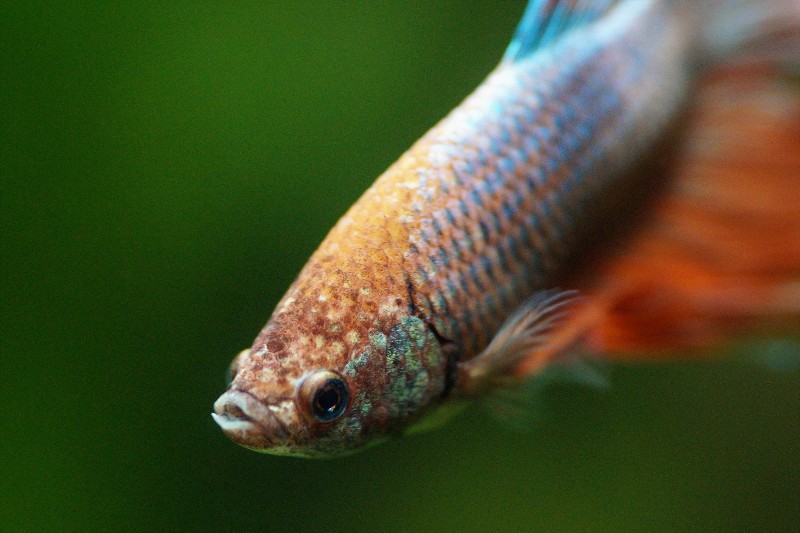
And just to be absolutely clear – the cheese is a metaphor, don’t start feeding your Betta fish bits of Edam if you run out of bloodworms…
Can bettas eat Bloodworms every day?
Feeding your Betta fish bloodworms every day is too much. You should limit bloodworms to a couple of meals a week at most. Anything more than that could cause your Betta to become unhealthy and lethargic, increasing the risk of various health issues.
This makes it difficult if you buy live bloodworms because they have a short shelf life before they will develop into midge flies. Live bloodworms have the best nutrient content, but you usually have to deal with a lot of wastage.
That’s why a lot of people prefer to buy either frozen or freeze-dried bloodworms.
What happens if you feed your Betta too many Bloodworms?
If you feed your Betta too many bloodworms, chances are they will become constipated. They aren’t able to fully digest the high volume of treat food and it will cause them digestive issues. They can also develop swim bladder disease.
What often happens if you try to feed your Betta too many bloodworms is that they will eat a little bit too much, giving themselves mild constipation, but then leave the rest. And this is also problematic because decaying bloodworms in the water will cause ammonia spikes.
Therefore, it’s important to ration the bloodworms properly, not only to prevent your Betta from eating too many but also to keep the water parameters safe for your Betta to be comfortable.
As The Nerdy Fish Girl (excellent name – check out her Instagram) says, you can use Seachem Nourish to supplement your Betta’s diet.
This ensures your Betta is getting a nutrient-rich diet and ultimately will live a longer, healthier life.
Do bettas like freeze-dried Bloodworms?
While every Betta is individual, the vast majority enjoy eating freeze-dried bloodworms. While they would prefer live bloodworms usually, freeze-dried options are still a tasty treat for them. Freeze-dried bloodworms have the least nutritional value, and come with some risks.
The main risk is constipation, as freeze-dried bloodworms can expand once they come into contact with water although this takes some time.
If your Betta fish has already eaten the bloodworms then the worm may expand when inside the fish’s gut, which can cause uncomfortable blockages and potentially even serious issues.
The other problem with freeze-dried bloodworms is that sometimes other fish or foods can be mixed in, especially if you buy cheap.
It’s important to always try to buy the most premium freeze-dried bloodworms that you can afford, as they will be the purest form and will contain the highest amount of protein.
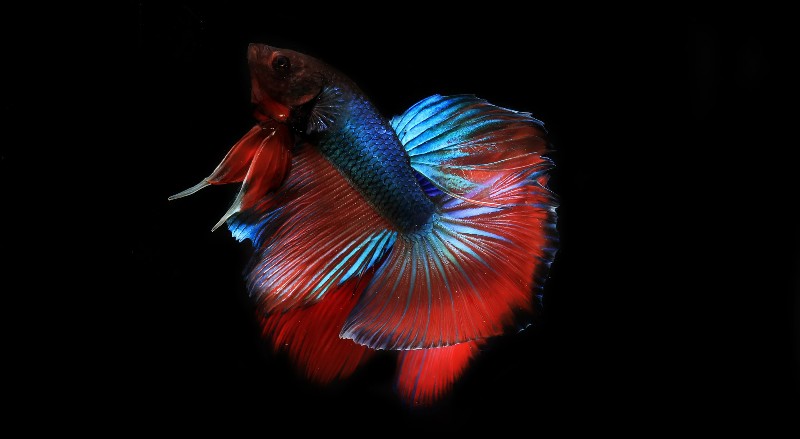
What are the different types of Bloodworms for your Betta fish?
Frozen Bloodworms
Frozen bloodworms offer a good balance between nutrition levels and storage life. Despite being frozen you should still only keep them for around six months. They come in the form of ice cubes, which you can cut up yourself to control portion sizes.
Once you have the portion you want, just let it thaw out before you add it to the tank. Cubes should be split into chunks that are small enough for your Betta to eat, but not so small that you can’t see them.
You should remove any that your Betta doesn’t eat within a couple of minutes to avoid contamination.
Frozen bloodworms also have the benefit of being likely to be free of diseases, since any bacteria and parasites are killed in the freezing process.
Live Bloodworms
In terms of pure nutrition, live bloodworms are the best option, as they’ve not undergone any of the processes that remove the good stuff from the worms. They also get your Betta into hunting mode, which is good for their mental health and stops any boredom.
Live bloodworms are also great if you’re breeding Bettas, as they make your Betta think there is more food available than normal which tricks them into the breeding mindset.
The downsides are that live bloodworms can only be stored for a few days at most before they develop into flies, and they are a bit more expensive as well, so any wastage will feel even more frustrating. They can also carry some bacteria and parasites.
Freeze-dried Bloodworms
Freeze-dried bloodworms can be stored in the cupboard for as long as you want them, and just need to be added to a small amount of water to prep them for eating. The freeze-drying process does kill a lot of the nutrients, but they do still contain some useful protein.
Freeze-dried bloodworms also tend to float at the top of the tank, which is your Betta’s preferred space to hunt for food which means they’re more likely to see them and eat them.

Bloodworms: nutritional information
Bloodworms are primarily a fatty food with a small amount of protein. This will vary depending on whether you’ve bought live (highest protein), frozen or freeze-dried. They lack many essential vitamins and minerals and so should not be used as an everyday meal.
There’s a lot of information about bloodworms here, including the nutritional breakdown. The good news is they provide plenty of iron, but the protein content is low compared to other fish foods.
Bloodworms are more of a treat and can be useful for any picky eaters. However, it’s still important to find the best all-round food for your Betta that gives them the other nutrients they need for a healthy diet.
Potential dangers of feeding Bloodworms to your Betta
Parasites
Live bloodworms can sometimes carry parasites that can cause diseases in your fish. The odds are low, but not completely unavoidable, so it’s something you just need to be aware of. Parasites are normally killed during the freezing or freeze-drying processes, making them a safer option.
Digestion issues/constipation
Too many bloodworms can cause your Betta to suffer from constipation, but a more pressing concern is the way that freeze-dried bloodworms expand in water.
If you don’t let them sufficiently expand before you add them into the tank, the Betta may eat them and then have the bloodworm expand inside their gut, causing dangerous blockages.
Ammonia spikes
Uneaten bloodworms will rot, which can cause ammonia spikes in the water. Betta will get sick if they are swimming in water with a high ammonia content, so it’s important to carefully portion bloodworms and to remove any that your Betta isn’t eating.
Prevention is better than cure here because water changes don’t always lower ammonia right away. Start off with small amounts of bloodworms and other foods, and increase if you’re concerned rather than the other way around.
How to feed Bloodworms to your Betta
How you feed bloodworms to your Betta depends on the type you’ve bought, but it’s important to prep them. Ideally rinse them to remove any debris, and avoid adding any water that the bloodworms came in into the tank, to minimize the risk of parasites.
Once rinsed, live bloodworms can be added straight into the tank. Frozen bloodworms should be defrosted first, and removed from the liquid left once thawed.
Freeze-dried bloodworms must be soaked in water for a couple of hours first to expand to full size. I use a small amount of tank water to be sure I’m not including any contaminants from untreated tap water.
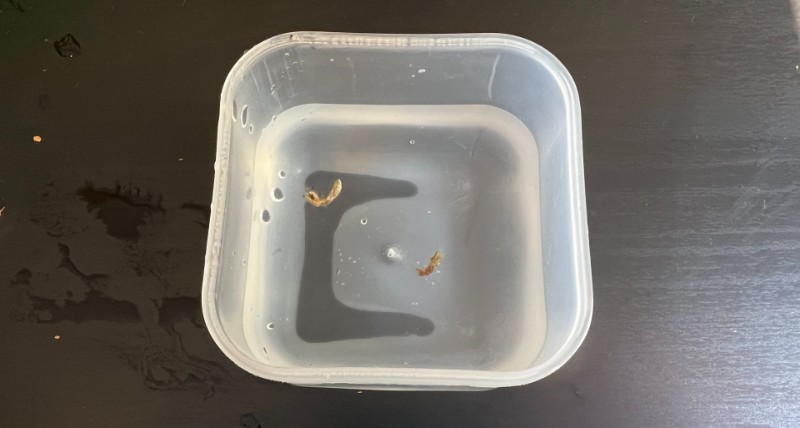
Summary
My main recommendation is that you don’t rely on bloodworms solely for your Betta’s diet – it’s not going to be healthy. Feed 1-2 of them to your Betta once or twice a week, but no more than that.
Always make sure you follow the preparation instructions carefully to avoid harming your fish.
As to whether you should buy live, frozen, or freeze-dried bloodworms – each has clear pros and cons and I don’t think there’s a clear winner.
I would say that it’s up to you and what you have available in a pet store you can trust. And if you’re still not sure, buy frozen – they’re a good middle ground in terms of nutrition and storage and should avoid the risk of parasites.

